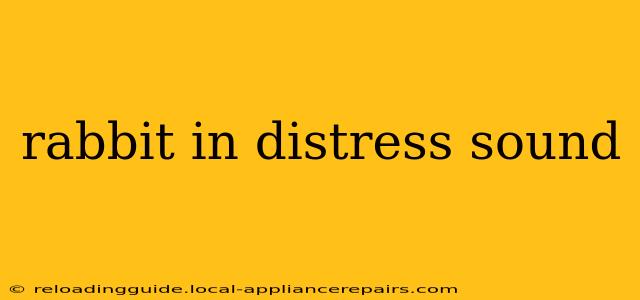Hearing a rabbit in distress can be incredibly upsetting. These gentle creatures rarely vocalize, so any sound they make is likely indicative of a problem. Understanding the different sounds a rabbit might make when in distress, the potential causes, and how to respond is crucial for responsible rabbit ownership. This guide will help you identify and address your rabbit's distress.
Identifying Sounds of a Rabbit in Distress
Rabbits don't "cry" like humans or dogs. Their distress calls are often subtle and easily missed by the untrained ear. Listen carefully for these common indicators:
High-Pitched Screeches or Yells
A high-pitched, almost shriek-like sound is a clear sign of significant pain or fear. This is a rabbit's emergency call, and immediate intervention is necessary. Possible causes include severe injury, a predator attack, or intense pain from an illness.
Repeated, Loud Thumps
While thumping is a normal rabbit behavior, repeated, loud thumping, especially combined with other distress signals, could indicate pain, anxiety, or fear. The rabbit might be trying to warn you of a problem.
Teeth Grinding
While subtle grinding of teeth can be a sign of contentment in some rabbits, loud or continuous teeth grinding is almost always a sign of pain or discomfort. This is a serious indicator requiring veterinary attention.
Whimpering or Soft Grunting
A soft whimper or grunt, especially when combined with other signs like hunched posture or lethargy, suggests discomfort or pain. The rabbit may be experiencing a minor injury or illness.
Vocalizations During Handling
Some rabbits may vocalize during handling, even if they are generally calm. However, if your rabbit usually enjoys handling but is suddenly vocalizing, it could be a sign of pain or discomfort in a specific area of their body. Gently examine your rabbit for any injuries.
Common Causes of Rabbit Distress
Understanding potential causes is essential for effective intervention. Some common reasons for rabbit distress include:
Medical Issues
- Injury: Falls, bites from other animals, or accidental injuries can cause significant pain and distress.
- Illness: Various illnesses, such as dental problems, GI stasis, infections, or internal injuries, can lead to distress vocalizations.
- Pain: Pain from any source, including injuries, illnesses, or even overgrown nails, can cause rabbits to vocalize.
Environmental Factors
- Predators: The presence or perceived presence of a predator (cats, dogs, etc.) can trigger extreme fear and distress.
- Stressful Environments: Loud noises, unfamiliar environments, or changes in routine can stress rabbits, leading them to vocalize.
- Lack of Resources: Insufficient food, water, or clean bedding can cause discomfort and distress.
Social Issues
- Territorial Disputes: Conflicts with other rabbits can lead to injuries and distress.
- Aggression: If your rabbit is being bullied by another animal, it might display distress.
What to Do If You Hear Your Rabbit in Distress
Immediate action is crucial.
- Assess the Situation: Carefully observe your rabbit to identify the potential cause of the distress. Look for any visible injuries, unusual behavior, or changes in their routine.
- Provide a Safe and Quiet Environment: Move your rabbit to a quiet, safe space away from potential stressors.
- Check for Injuries: Gently examine your rabbit for any wounds, broken bones, or other injuries.
- Contact Your Veterinarian: If your rabbit is exhibiting significant distress, contact your veterinarian immediately. This is especially important if you notice symptoms like lethargy, lack of appetite, or unusual excrement.
- Monitor Your Rabbit: Carefully monitor your rabbit's behavior and vital signs. Note any changes in their condition and report them to your veterinarian.
Remember, early intervention is key to ensuring your rabbit's health and well-being. Paying close attention to their vocalizations and overall behavior is vital for responsible rabbit ownership. If in doubt, always seek veterinary advice.

